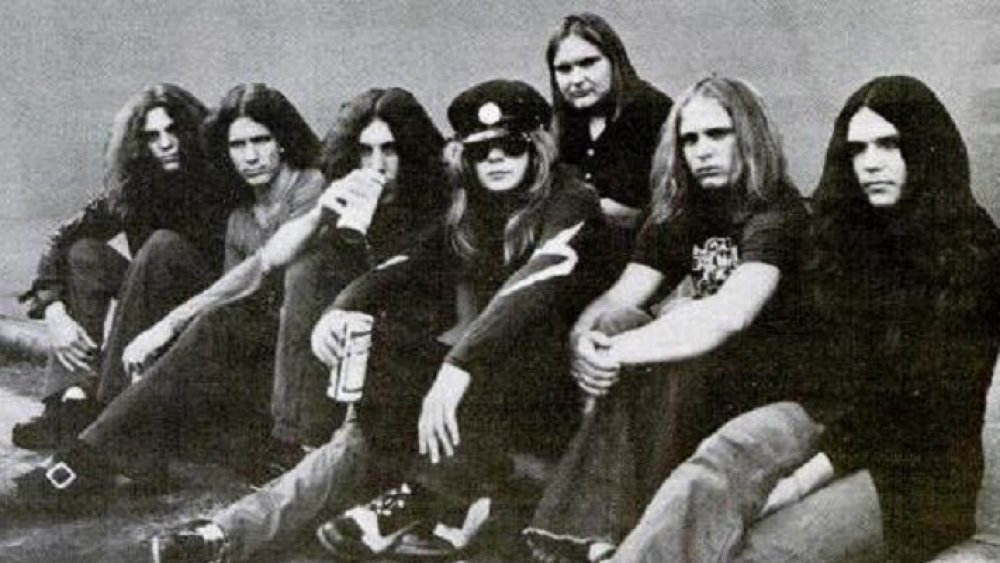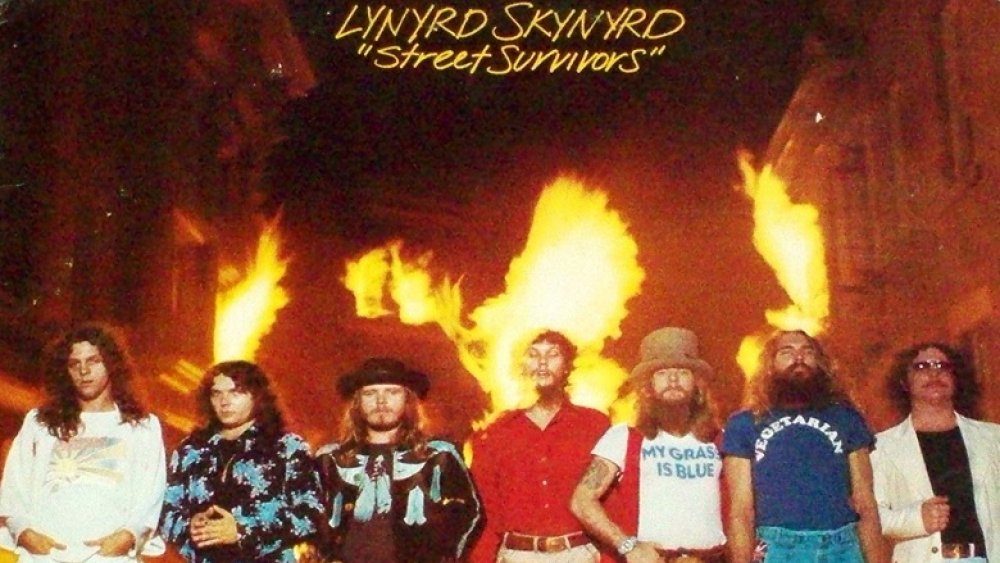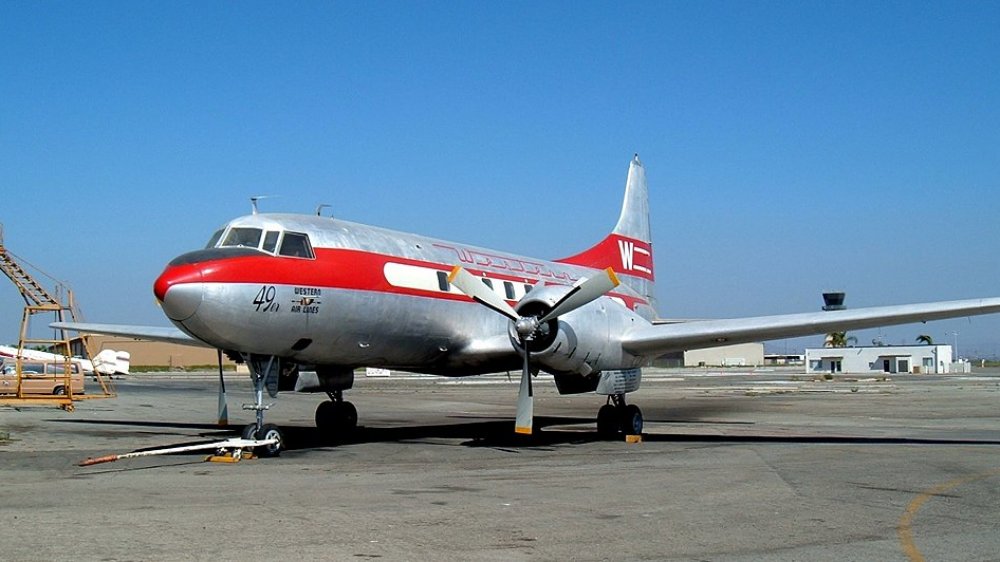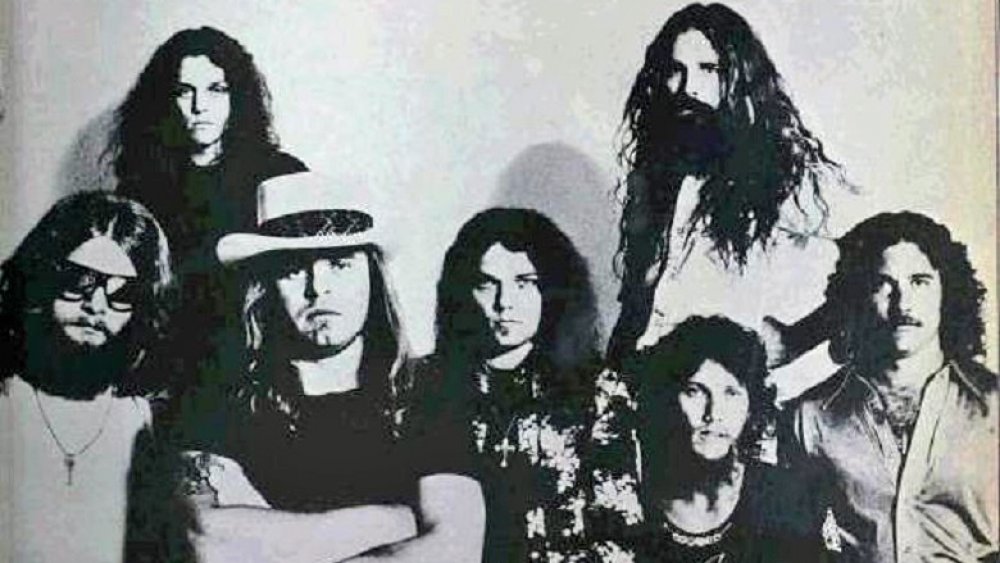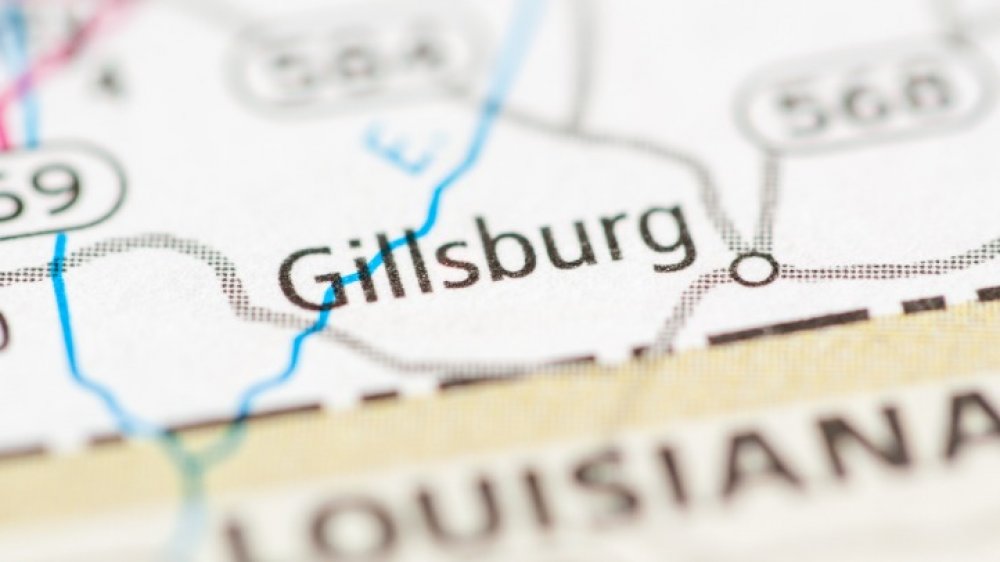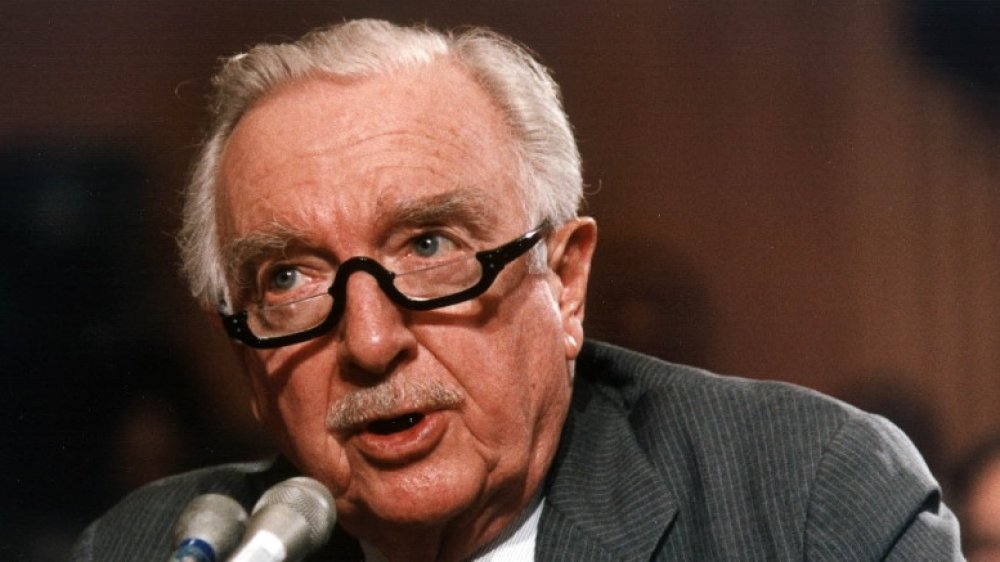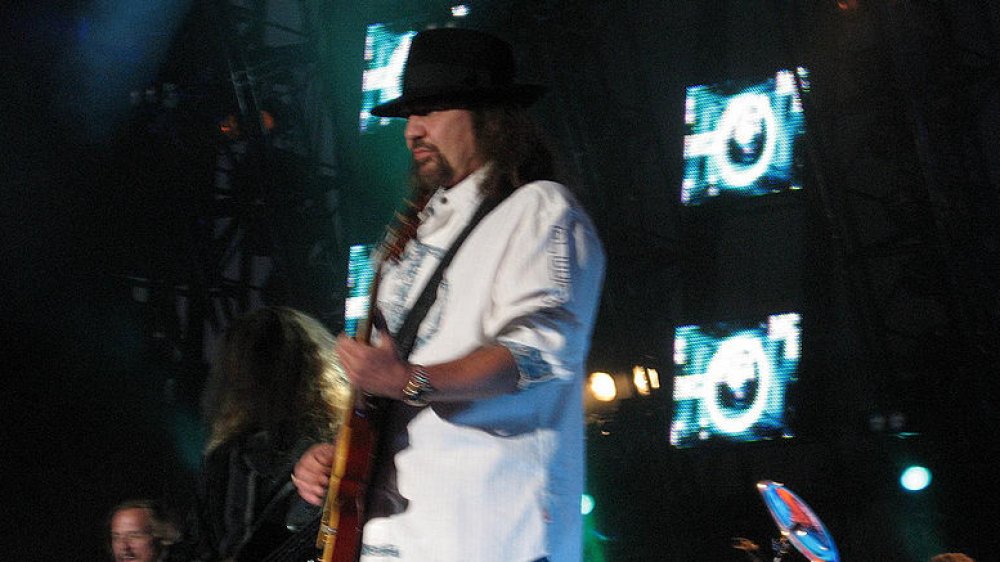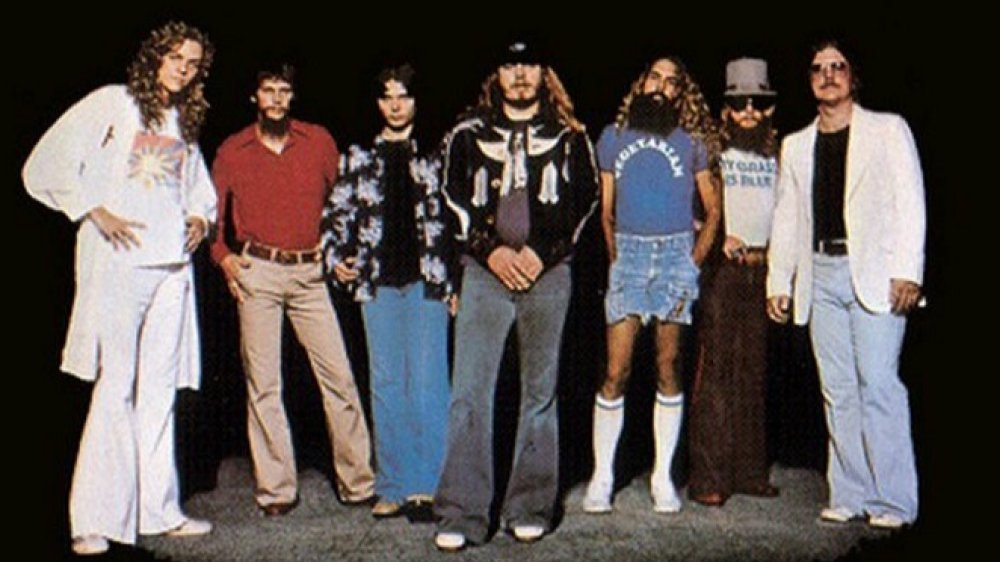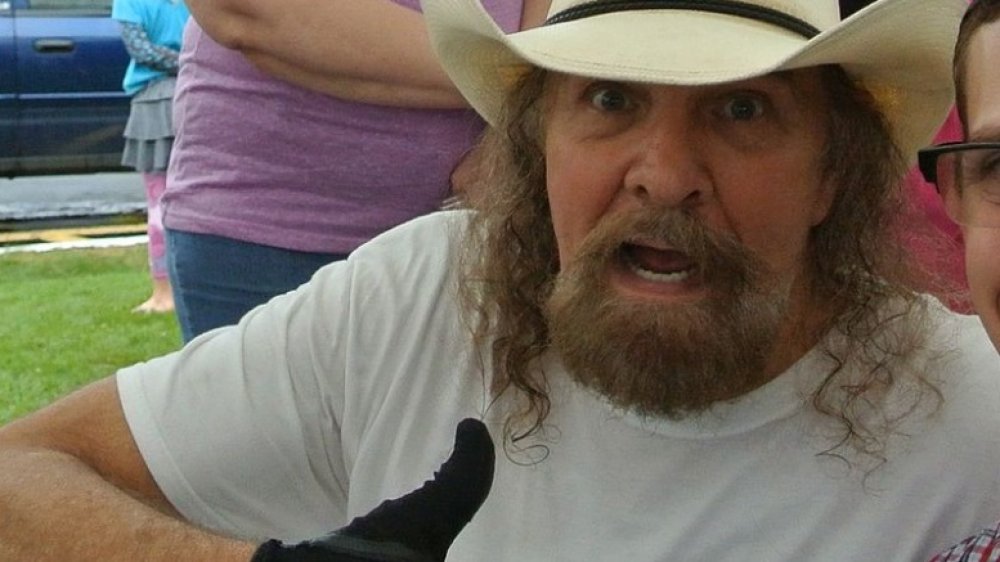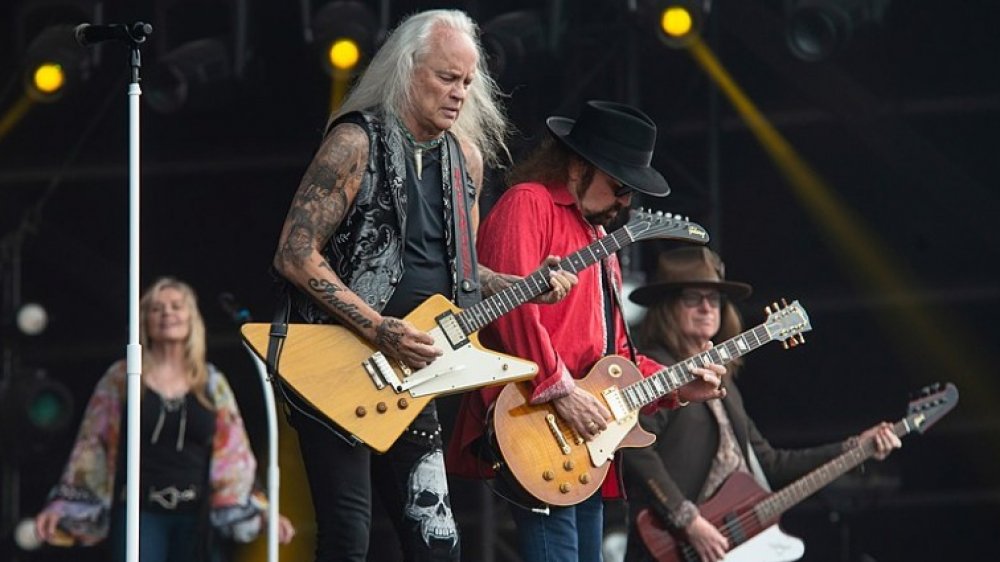Disturbing Details About The Lynyrd Skynyrd Plane Crash
We may receive a commission on purchases made from links.
For music history buffs, the name Lynyrd Skynyrd instantly conjures up the day in 1977 when three band members, including founder Ronnie Van Zant, died in a plane crash in the woods of Mississippi. It wasn't the first, or the last, time that a set of multi-talented musicians died aboard a plane. But for those who knew the band's story and their growing rise to fame, that day was one of the most tragic in rock history.
According to writer Jaan Uhelski, Lynyrd Skynyrd's beginnings date clear back to 1964 at a ball field in Florida, where Van Zant inadvertently smacked a ball right at Bob Burns and knocked him out. Burns happened to be a drummer and was a friend of guitarist Gary Rossington. A quick apology later, Van Zant, Burns and Rossington were noodling around with their instruments, and decided to form a band. Soon they added guitarist Allen Collins and bass player Larry Jungstrom. A band was born.
After experimenting with several different names for the band, the group settled on Lynyrd Skynyrd as a roast of Leonard Skinner — a high school gym teacher who once banned three of the group members for ignoring his orders to cut their hair. America embraced Lynyrd Skynyrd as a hard-drinking, southern rock party band. Their first four albums would eventually go silver, gold, and platinum.
Lynyrd Skynyrd's fateful Convair 240
By October 15, 1977, Lynyrd Skynyrd was skyrocketing to fame and had several new members when they set out on a three-month tour. Two days later their fifth album, Street Survivors, debuted. The album cover featured the entire band (except for their background singers) standing together. Guitarist and vocalist Steve Gaines was in the center, standing with his eyes closed, mouth open. That image was selected for the cover, with flames superimposed all around the group against a city backdrop. It was a bit eerie, to say the least.
According to Check Six, the plane the band chose for the tour was a 1948 Convair 240, a twin-engine plane that had already accumulated over 29,000 flight hours. The aircraft was old; earlier that year, members of Aerosmith's flight crew had declined to use it because they felt it wasn't up to snuff. One of the Aerosmith's crew later recalled that pilots Walter McCreary and William Gray shared a bottle of Jack Daniels as the plane was inspected for that band.
Although at least one band member, Cassie Gaines, expressed doubts about flying on the Convair, Van Zant talked everyone into using it. "If it's your time to go, it's your time to go," he quipped just before boarding. Thus the entire band — Allen Collins, Steve and Cassie Gaines, Leslie Hawkins, Billy Powell, Artimus Pyle, Gary Rossington, Leon Wilkerson, and Van Zant — boarded the plane along with eighteen other crew members, and prepared for takeoff.
Lynyrd Skynyrd found themselves out of fuel
On October 20th, the Convair 240 (similar to the one pictured) departed the airport at Greenville, South Carolina at 4:02 p.m. after being filled with 400 gallons of 100-octane, low-lead fuel. Lynyrd Skynyrd was headed for Baton Rouge, Louisiana for their next concert. McCreary gave an ETA of 6:45 p.m. He also notified the flight tower that he had five hours of fuel on board, and was given a weather briefing in return. Two and-a-half hours later, however, McCreary radioed the Air Traffic Control Center in Houston that "we're low on fuel and we're just about out of it."
The Control Center next granted McCreary's request to land at McComb Airport in Mississippi. "We are not declaring an emergency, but we do need to get close to McComb as straight and good as we can get, sir," McCreary stated. Less than a minute later, however, the pilot announced, "We're out of fuel." Houston asked McCreary to confirm that. The response was, "I am sorry, it's just an indication of it." It was the last communication from the plane.
Meanwhile, according to Billy Powell, "Everybody was just doing their own thing" when the pilots alerted them to the situation. Artimus Pyle, a pilot himself, told everyone how to prepare for the inevitable crash. He recalled Van Zant shaking his hand as if to say goodbye. But "instead of panicking," said Powell, "everybody was sitting there praying." But it would be 10 harrowing minutes before the plane touched down.
A catastrophic landing
The band that was Lynyrd Skynyrd (pictured here in 1977 before the tour) had gone from playing cards while Van Zant napped on the floor, to fearing for their lives. The plane was gliding at a five degree angle before finally heading into the trees near Gillsburg, Mississippi. "I remember we started clipping those pine trees," Powell said. "It felt like being rolled down a hill in a garbage can and being hit by about a hundred baseball bats at the same time." The sounds he heard were the plane hitting the trees, some as high as 80 feet tall.
As recorded in the official accident report, even after the plane made impact with the ground, the Convair skidded another 140 feet — a total of 495 feet from the time it hit the first tree on the way down. The wings were torn off along the crash path. The cockpit smashed into a tree, killing McCreary and Gray, and the fuselage became separated. Inside, the cabin seats were torn apart as the plane continued on its path. According to a 1977 interview with Rolling Stone magazine, Powell said, "I crashed into a table; people were hit by flying objects all over the plane." The top of the plane tore open as it glided through the trees, throwing people out and leaving a path of instruments and other items from the passenger section. At last the aircraft slid to a stop in a swampy, wooded area.
'We got to get them out'
Powell crawled out of the wreckage and saw that the fuselage, cockpit, wings and tail section were gone, "just crushed to pieces." His nose, he discovered, was now hanging from the side of his face and bleeding profusely. The musician sat on top of the airplane in shock for a few minutes, crying, before he heard people calling for help. "I remember hearing Leon screaming, 'Get me out of here,'" he said. People were trapped inside. Powell pulled off his t-shirt, clamped it over his nose and began trying to help. Then he spotted Pyle trying to crawl out of the wreckage, his ribs "sticking out" of his chest, as Powell told Rolling Stone (via Check Six).
Road crew member Ken Peden next exited the plane and, along with Powell and Pyle, set out in search of help. Pyle would later remember that his shoes had been knocked off and his socks "were hanging off my toes about six inches." He couldn't pull them up due to his injuries. The men made their way through the thick brush to the farm of Johnny Mote, who said the plane crash "sounded like a car skidding in the gravel" and heard a "deep rumble." Thinking the men were escaped convicts, Mote fired his rifle in the air before he realized they needed help. "One of them was hugging me around the neck," he said, "and telling me, 'We got to get them out.'"
Media reports on the Lynyrd Skynyrd plane crash
There was no help for pilots McCreary and Gray, band members Cassie Gaines, Steve Gaines and Ronnie Van Zant, or assistant road manager Dean Kilpatrick. All six were killed on impact. Six others were injured, including Powell and Pyle: band members Allen Collins, Leon Wilkeson, and Gary Rossington, as well as security manager Gene Odom. In a look back at the incident in 2017, Rolling Stone magazine reported the other 14 survivors "endured shattered bones, torn flesh, lengthy hospitalizations and grueling rehabilitations."
It would take awhile for news of the crash to reach the media. By that evening and the next morning, however, music lovers and fans nationwide were shocked and saddened as radio disc jockeys and newspapers announced the horrible news. One fan remembered Walter Cronkite (pictured) reporting the tragedy on CBS's 8:20 p.m. newsbreak. Everyone listened anxiously as officials worked to identify and release the names of those killed.
In the coming weeks, Lynyrd Skynyrd would become a household name as reports of the horrific tragedy drifted across the world. A witness, Norman Travis, shook his head as he told news reporters, "It was just terrible. People were hollerin' and screamin', and I've never witnessed anything before in my life like that." Dozens of news crews flocked to the site of the crash. One reporter who was there just over a week later told the camera, "You can't even realize, seeing one of these things on television, exactly what a crash of this magnitude looks like."
The official causes of the Lynyrd Skynyrd plane crash
The same reporter who talked of the magnitude of the crash pondered, "Authorities still believe the plane ran out of gas. But why? Didn't they put enough gas in the tanks?" After a lengthy investigation, the U.S. National Transportation Safety Board released its official investigation into the accident later that month. Nine separate findings were listed, including statements that both engines on the plane "ceased to produce power because the aircraft's useable [sic] fuel was exhausted" and that the crew, Walter McCreary and William Gray, "failed to monitor adequately the fuel flow, en route fuel consumption, and fuel quantity gages [sic]." The crew also failed to "take appropriate pre-flight action to assure an adequate fuel supply," and flew for some time with the right engine's fuel mixture "in the auto-rich position."
Most telling was the final statement that the fuel exhaustion was contributed to by "an engine malfunction of undetermined nature in the right engine which resulted in higher-than-normal fuel consumption." That would explain why, on another flight two days earlier, Allen Collins witnessed a 10-foot flame shooting out of the right engine. Gary Rossington (pictured in 2008) recalled that "Allen was real upset. He didn't want to get on that plane. He said, 'I'm not gonna get on it because it's not right.'" Ironically, Artimus Pyle said that as the band flew on the fateful craft, they decided to secure a Learjet for future flights and a "beautiful bus for the crew. It was ridiculous for us to be on an old plane like that."
The cover of Lynyrd Skynyrd's Street Survivors
In the wake of the plane crash, grieving fans and curious music lovers turned to the ominous cover of Lynyrd Skynyrd's latest album, Street Survivors. Although the Transportation Safety Board report stated there was no fire due to there being no fuel, the fiery cover of the album seemed to foretell the fate of the band. According to Time, the band's families were especially affected by the photograph and asked MCA Records to replace it. The new cover featured an image from the same photography shoot, sans the flames, while the old image was moved to the back.
Both versions of Street Survivors sold quickly, to the tune of 500,000 records within a short time. Billboard magazine's "Billboard 200" list for December 10, 1977 showed the album topped out at number five on the chart. The album eventually became the band's second platinum album. In 2007, a 30th Anniversary issue of the record once again featured the original front cover. In addition, several expanded and re-mastered versions of the album are available today.
A decade of slow healing for the remaining members of Lynyrd Skynyrd
With the plane crash behind them, it would take time for everyone involved with Lynyrd Skynyrd to recover. Five surviving band members — Allen Collins, Billy Powell, Gary Rossington, Leon Wilkerson, and Artimus Pyle — suffered critical injuries, from multiple broken bones to debilitating internal injuries. Just days after the crash, a television reporter asked the ailing Powell, "Will there be a Lynyrd Skynyrd after this?" The saddened musician replied, "I don't think so."
Over the next decade, the band remained in limbo even as their records continued to sell. Finally, however, what was left of the original Lynyrd Skynyrd reunited in 1987, according to Check Six. Joining them was a former guitarist for the group, Ed King. Johnny Van Zant (pictured), the younger brother of Ronnie, stepped up as lead singer. Together, the new band began working on new songs. On September 23, 1987, the group began a road tour together, starting with a show in California. The result was the new Southern by the Grace of God live album.
But there would still be more tragedies: Collins, who was left paraplegic after a motorcycle accident in 1986 (but kept traveling with the band as musical director), succumbed to pneumonia in 1990. Wilkerson was found dead in his hotel room in 2001. And in 2009, Powell died of a heart attack. That left Rossington and Pyle as the only surviving members of the original band.
A documentary and a movie about the Lynyrd Skynyrd plane crash
In 2016, Deadline reported that Cleopatra Films was planning a feature film about Lynyrd Skynyrd. Based on the recollections of Artimus Pyle (pictured here in 2011), the film was to be directed by Jared Cohn, who was co-writing the script with Pyle. The plane crash was to be focused upon in particular. Gary Rossington and the heirs of Steve Gaines and Ronnie Van Zant objected to the idea, claiming "the survivors took a 'blood oath' to never use the name Lynyrd Skynyrd again." And, following the Southern by the Grace of God live album, everyone had entered into a "Consent Order" agreement wherein the "bargained-for rights" of the band would be protected. Ultimately, according to the Hollywood Reporter, a judge upheld the Consent Order and the movie was prevented from being released.
Fast forward to August 2018 when Gary Rossington appeared and narrated part of a documentary, Lynyrd Skynyrd: If I Leave Here Tomorrow debuted on Showtime. The film included plenty of footage of the original band, as well as haunting recollections of the plane crash. Then, in October, the Second U.S. Circuit Court of Appeals in Manhattan, New York ruled that Pyle's film idea, Street Survivors: The True Story of the Lynyrd Skynyrd Plane Crash, could be released as well. The movie was presumably finished, since Rolling Stone reported it cost $1.2 million dollars to make. It was released in 2020.
Lynyrd Skynyrd today
Today, in the deep woods near Gillsburg, the crash site of one of America's most famous southern rock bands remains quiet. The words "FREE BIRD" and several names and messages are carved into trees at the site. Nearby is a metal stand with neon lights, honoring those who died so long ago. These tributes have been left by fans daring to cross private property lines to pay respect Lynyrd Skynyrd and the band's horrific and historic fate.
In October 2019, Ronnie Van Zant's widow, Judy Van Zant-Jeness, joined others to dedicate a new monument, created with money from the Lynyrd Skynyrd Monument Project. President Bobby McDaniel raised a combined total of $80,000 for the large black granite marker. In reporting on the event, the Clarion Ledger said any leftover money would be given to the living survivors of the wreck to help with their ongoing medical expenses. "It's been 42 years today since we lost Ronnie, Steve, Cassie and Dean," said a tearful Van Zant-Jeness. "But they will live on through the music of Lynyrd Skynyrd and all of the fans from around the world."
Gary Rossington, meanwhile, remained the only original member of Lynyrd Skynyrd in 2019. The band was still touring, though, and released the Lynyrd Skynyrd: Last of the Street Survivors Farewell Tour Lyve! album in November of that year. According to Rolling Stone, the group (shown here at Hellfest in 2019) announced their "Last of the Street Survivors Farewell Tour" would begin in March 2020.
